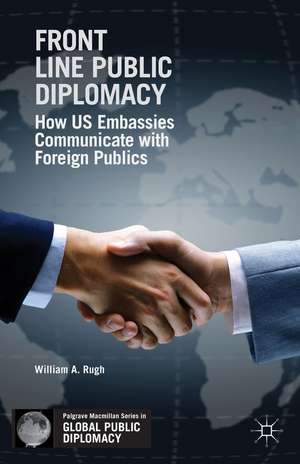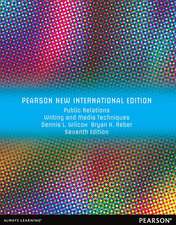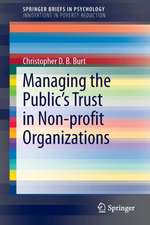Front Line Public Diplomacy: How US Embassies Communicate with Foreign Publics: Palgrave Macmillan Series in Global Public Diplomacy
Autor W. Rughen Limba Engleză Hardback – 20 aug 2014
| Toate formatele și edițiile | Preț | Express |
|---|---|---|
| Paperback (1) | 384.86 lei 6-8 săpt. | |
| Palgrave Macmillan US – 20 aug 2014 | 384.86 lei 6-8 săpt. | |
| Hardback (1) | 389.70 lei 6-8 săpt. | |
| Palgrave Macmillan US – 20 aug 2014 | 389.70 lei 6-8 săpt. |
Din seria Palgrave Macmillan Series in Global Public Diplomacy
-
 Preț: 301.10 lei
Preț: 301.10 lei -
 Preț: 302.20 lei
Preț: 302.20 lei -
 Preț: 148.22 lei
Preț: 148.22 lei -
 Preț: 385.47 lei
Preț: 385.47 lei - 15%
 Preț: 639.25 lei
Preț: 639.25 lei - 15%
 Preț: 642.51 lei
Preț: 642.51 lei - 18%
 Preț: 830.70 lei
Preț: 830.70 lei -
 Preț: 389.70 lei
Preț: 389.70 lei -
 Preț: 387.75 lei
Preț: 387.75 lei -
 Preț: 386.61 lei
Preț: 386.61 lei -
 Preț: 385.08 lei
Preț: 385.08 lei - 8%
 Preț: 588.90 lei
Preț: 588.90 lei - 18%
 Preț: 791.40 lei
Preț: 791.40 lei - 18%
 Preț: 732.52 lei
Preț: 732.52 lei - 18%
 Preț: 738.37 lei
Preț: 738.37 lei - 18%
 Preț: 947.85 lei
Preț: 947.85 lei - 15%
 Preț: 643.65 lei
Preț: 643.65 lei - 18%
 Preț: 889.43 lei
Preț: 889.43 lei - 18%
 Preț: 944.82 lei
Preț: 944.82 lei - 18%
 Preț: 722.12 lei
Preț: 722.12 lei -
 Preț: 351.49 lei
Preț: 351.49 lei -
 Preț: 290.99 lei
Preț: 290.99 lei -
 Preț: 390.63 lei
Preț: 390.63 lei -
 Preț: 387.75 lei
Preț: 387.75 lei -
 Preț: 390.25 lei
Preț: 390.25 lei -
 Preț: 386.81 lei
Preț: 386.81 lei -
 Preț: 387.75 lei
Preț: 387.75 lei -
 Preț: 387.75 lei
Preț: 387.75 lei
Preț: 389.70 lei
Nou
Puncte Express: 585
Preț estimativ în valută:
74.58€ • 80.98$ • 62.65£
74.58€ • 80.98$ • 62.65£
Carte tipărită la comandă
Livrare economică 23 aprilie-07 mai
Preluare comenzi: 021 569.72.76
Specificații
ISBN-13: 9781137444141
ISBN-10: 1137444142
Pagini: 276
Ilustrații: XII, 276 p.
Dimensiuni: 140 x 216 x 23 mm
Greutate: 0.45 kg
Ediția:2014
Editura: Palgrave Macmillan US
Colecția Palgrave Macmillan
Seria Palgrave Macmillan Series in Global Public Diplomacy
Locul publicării:New York, United States
ISBN-10: 1137444142
Pagini: 276
Ilustrații: XII, 276 p.
Dimensiuni: 140 x 216 x 23 mm
Greutate: 0.45 kg
Ediția:2014
Editura: Palgrave Macmillan US
Colecția Palgrave Macmillan
Seria Palgrave Macmillan Series in Global Public Diplomacy
Locul publicării:New York, United States
Cuprins
Table of Contents
Acknowledgements
Introduction
PART I: THE CONTEXT
1. Legacy: Philosophy and Legal Basis
2. Public Diplomacy Personnel as FSOs
PART II: FIELD OFFICE MANAGEMENT
3. The Public Affairs Officer
4. Contacts and Personal Networking
PART III: INFORMATION PROGRAMS
5. Traditional Media
6. Social Media: Use in Public Diplomacy
7. Social Media: Factors to Consider
PART IV: CULTURAL AND EDUCATION PROGRAMS
8. Cultural Programs
9. Centers, Libraries and Other American Spaces
10. Educational Exchanges
PART V: PENTAGON COMMUNICATIONS
11. Defense Department Communications Expansion
12. Comparing DOD and State's Communications
Conclusion
13. Changes and Enduring Principles in PD Practice
Acknowledgements
Introduction
PART I: THE CONTEXT
1. Legacy: Philosophy and Legal Basis
2. Public Diplomacy Personnel as FSOs
PART II: FIELD OFFICE MANAGEMENT
3. The Public Affairs Officer
4. Contacts and Personal Networking
PART III: INFORMATION PROGRAMS
5. Traditional Media
6. Social Media: Use in Public Diplomacy
7. Social Media: Factors to Consider
PART IV: CULTURAL AND EDUCATION PROGRAMS
8. Cultural Programs
9. Centers, Libraries and Other American Spaces
10. Educational Exchanges
PART V: PENTAGON COMMUNICATIONS
11. Defense Department Communications Expansion
12. Comparing DOD and State's Communications
Conclusion
13. Changes and Enduring Principles in PD Practice
Recenzii
"As the role of public opinion in policy making continues to grow around the globe, there is increasing appreciation for the importance of public diplomacy as an aspect of U.S. foreign policy. Rugh picks up this theme, delivering an expert account not only of the 'theory' of what public diplomacy is and how to best practice it; he also shares insightful, real-world examples, drawn both from his own extensive professional experience and from the now rather considerable PD literature. Ambassador Rugh has provided an invaluable resource to the field of public diplomacy, one destined to become indispensible in the teaching of PD tradecraft, as well as a go-to reference for current practitioners in the field."
- Middle East Policy
"The book is a perfect text to be included in the study of American foreign policy or diplomacy, especially in the Middle East. It is a must-read for any incoming Under Secretary for Public Diplomacy and/or Public Affairs, not to mention high-level military commanders in the field who have been running their own public diplomacy operations."
- International Journal of Middle East Studies
"Ambassador William Rugh, one of the most distinguished American practitioners of the art of public diplomacy, has written a remarkable book. From basic principles through to the subtleties of today's social media this is the essential guide for any public diplomat headed for the field or for any analyst who wishes to understand how this essential element of international relations is practiced. This book will be required reading in diplomatic training classes in the US and one anticipates further afield also."
- Nicholas J. Cull, Professor of Public Diplomacy, University of Southern California, USA
"Ambassador Rugh's book is a comprehensive and detailed exposition of the real world of public diplomacy from the practitioner's perspective. It will be invaluable to all who wish to understand the complexities of 21st century public diplomacy. It is a highly informed and eloquent exposition of the critical contribution of soft power to the promotion of American policies and values. It should be a standard work for all who seek to understand and explain contemporary public diplomacy."
- Anthony Quainton, Distinguished Diplomat-in-Residence at American University, USA, and former Director General of the US Foreign Service
"Ambassador Rugh presents a comprehensive, current and insightful overview of U.S. public diplomacy field operations, filling a long-vacant niche in real-world PD resources for professors and students. His deep background as a distinguished practitioner of PD makes for a nuanced yet focused presentation of the opportunities and challenges facing PD professionals past and present."
- Elizabeth Whitaker, Adjunct Professor of Public Diplomacy at Georgetown and George Washington Universities, USA, and former US Deputy Assistant Secretary of State
"Front Line Public Diplomacy is an extensive, informative addition to the field of public diplomacy, with a comprehensive analysis of what makes people-to-people diplomacy tick. While focusing on the breadth of U.S. public diplomacy strategy and tactics, the book gives insights that can be easily applied to other contexts in international settings. The book captures the history of U.S. public diplomacy, as well as contemporary trends including the role of social media, interagency issues, and the civilian-military nexus, so essential in understanding public diplomacy in active combat zones."
- Bridget Gersten, senior-level career diplomat and Foreign Service Officer with the US Department of State
- Middle East Policy
"The book is a perfect text to be included in the study of American foreign policy or diplomacy, especially in the Middle East. It is a must-read for any incoming Under Secretary for Public Diplomacy and/or Public Affairs, not to mention high-level military commanders in the field who have been running their own public diplomacy operations."
- International Journal of Middle East Studies
"Ambassador William Rugh, one of the most distinguished American practitioners of the art of public diplomacy, has written a remarkable book. From basic principles through to the subtleties of today's social media this is the essential guide for any public diplomat headed for the field or for any analyst who wishes to understand how this essential element of international relations is practiced. This book will be required reading in diplomatic training classes in the US and one anticipates further afield also."
- Nicholas J. Cull, Professor of Public Diplomacy, University of Southern California, USA
"Ambassador Rugh's book is a comprehensive and detailed exposition of the real world of public diplomacy from the practitioner's perspective. It will be invaluable to all who wish to understand the complexities of 21st century public diplomacy. It is a highly informed and eloquent exposition of the critical contribution of soft power to the promotion of American policies and values. It should be a standard work for all who seek to understand and explain contemporary public diplomacy."
- Anthony Quainton, Distinguished Diplomat-in-Residence at American University, USA, and former Director General of the US Foreign Service
"Ambassador Rugh presents a comprehensive, current and insightful overview of U.S. public diplomacy field operations, filling a long-vacant niche in real-world PD resources for professors and students. His deep background as a distinguished practitioner of PD makes for a nuanced yet focused presentation of the opportunities and challenges facing PD professionals past and present."
- Elizabeth Whitaker, Adjunct Professor of Public Diplomacy at Georgetown and George Washington Universities, USA, and former US Deputy Assistant Secretary of State
"Front Line Public Diplomacy is an extensive, informative addition to the field of public diplomacy, with a comprehensive analysis of what makes people-to-people diplomacy tick. While focusing on the breadth of U.S. public diplomacy strategy and tactics, the book gives insights that can be easily applied to other contexts in international settings. The book captures the history of U.S. public diplomacy, as well as contemporary trends including the role of social media, interagency issues, and the civilian-military nexus, so essential in understanding public diplomacy in active combat zones."
- Bridget Gersten, senior-level career diplomat and Foreign Service Officer with the US Department of State
Notă biografică
William A. Rugh was a Foreign Service Officer for 31 years and served twice as US ambassador. He holds a PhD and has taught public diplomacy at the Fletcher School. He is the author of books and articles on public diplomacy and US foreign policy.
Textul de pe ultima copertă
This book presents the first-ever close and up-to-date look at how American diplomats working at our embassies abroad communicate with foreign audiences to explain US foreign policy and American culture and society. Projecting an American voice abroad has become more difficult in the twenty-first century, as terrorists and others hostile to America use modern communication means to criticize us, and as new communication tools have greatly expanded the worldwide discussion of issues important to us, so that terrorists and others hostile to us have added negative voices to the global dialogue. It analyzes the communication tools our public diplomacy professionals use, and how they employ interpersonal and language skills to engage our critics. It shows how they overcome obstacles erected by unfriendly governments, and explains that diplomats do not simply to reiterate set policy formulations but engage a variety of people from different cultures in a creative ways to increase their understanding of America.
















